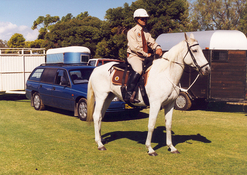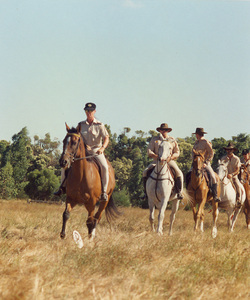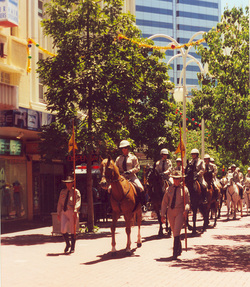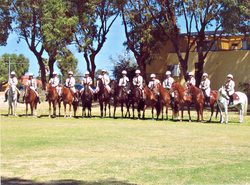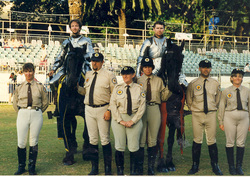|
History of Leadership
Dave Emery (Section Leader) 1987 - 1990 Helen Iles (Local Manager) 1990-2003 Andy Ryall (Deputy Manager) 1993-2003 Stuart Jones (Acting Local Manager- appointed Local Manager in December 2004 - 2014 Angela Stokovic (Training Manager) 2002-2004 Helen Iles (Deputy Manager and Training Manager) 2004-2006 Dom Capuzza (Deputy Manager) 2006 - 2009 Frank Meredith & Angela Stokovic (Training Managers) 2006 Natalie Beard nee Wegner (Deputy Manager) 2010 - 2014 Helen Iles (Training Manager) 2010 - 2013 Natalie Beard (Acting Local Manager) 2015 Corrie Onderwater-Markovic (Acting Deputy Manager) 2015- appointed Deputy Manager in December 2016) Mel Cooper (Training Manager) 2014 Natalie Beard (Local Manager) 2016 |
History of the Mounted Section
Dave Emery, a member of the Armadale SES Unit, formed the WASES Mounted Section in August 1987. He led the Unit until 1990. The Unit was officially recognized at a ceremony in November 1987.The handful of Unit members met separately and trained separately yet was a sub-branch of Armadale until 1991. Early in 1988 Dave Emery recruited a Training Officer, Helen Iles, who officially joined the Service in February and commenced to develop training suitable for mounted personnel and implemented a training programme and leadership structure for the Unit. In 1991, after several searches in which the Mounted Section were involved, it was decided the Unit should become a Regional Resource and was taken over by Metro Region. Helen Iles was nominated by the Unit for the position of Local Manager, and was appointed to the position by WASES in April 1990. A Committee structure to attend to Unit business was established. A Unit Constitution was drawn up and Andy Ryall, who had joined the Unit in 1990, was appointed as the Unit’s first Deputy Manager in 1993? In the early years the Units meetings were held in hotels and members houses while training took place at various venues. The Unit’s first official search was in February that year, at Araluen, searching for Susan Elliot, an abducted schoolgirl. Requests for the Mounted Section started to flood in, including requests for displays and attending parades. The Unit was invited to attend the Rockingham Anzac Parade, which continues to the current day. The Unit’s Tent-pegging team commenced training in 1989, but disbanded late the same year. A Quadrille team was also formed, the Quadrille team performing for the first time at Armadale Fair in March 1989. Many musical displays have been performed over the years, from Emergency Expos to the Night of Stars. In early 1997, the Unit was approached to assist with the equestrian activities for the International Tattoo and commenced selecting and training horses for the Kings Troop Royal Horse Artillery and the Royal British Armoury. This training continued for six months and culminated in a month of working with the British contingent and taking a role as safety riders and handlers for the whole of the event. This included riding roles as Squires and unmounted roles of Crash Team members and grooms. This was a major highlight of the Mounted Section’s non-operational activities. The Unit gained strength in membership and recognition for its value to search and moved its training venue to Metro Regional Headquarters FESA at 91 Leake Street Belmont in 2000. In 2001 the Unit was also handed the role of Animal Evacuation and commenced training SES volunteers from across the Units. The Unit was a joint winner in the National Safety Awards, in the Pre-Disaster Category, along with Animal Emergency Group counterparts RSPCA and WA Rangers Association. Until the Introduction of ESL funding in 2001 The Mounted Section was strictly self-funded. Apart from some help with courses and the purchase of radios the Unit had to raise its own capital to function. Doing pony rides, selling chocolates, assisting at Skyshow and any other opportunity that arose, raised money. Since the introduction the Unit has been provided with an annual budget to assist in its running costs. The Unit Budget is part of the Metropolitan Region Budget. In 2001 thanks to Unit fundraising, applications for grants and considerable lobbying and hard work by the then Local Manager, Helen Iles, the Unit obtained its first vehicle. Over the years the Unit’s profile has evolved from simply being a specialist search unit to include responsibility for management of the SES Animal Rescue Unit and the provision of operational support to Region and other units during hazards such as storms, cyclones, floods and fires. In 2004 Helen Iles, due to her status as a FESA employee, was required to resign her position of Local Manager after 14 years in the position. Stuart Jones accepted the role of Acting Local Manager for 12 months. Helen Iles continued on as Deputy Manager and Training Manager, taking over the training from Angela Stokovic who was Training Manager from 2002-2004. On the 20th December 2004 Stuart was officially appointed as Local Manager and has continued in that position until this date. In 2006 Dom Capuzza was appointed as Deputy Manager. Frank Meredith and Angela Stokovic accepted the role of joint Training Managers in 2006. In 2005 the Unit was challenged to prove its value to FESA in roles other than Search and Rescue. A thorough review of the Units skills, functions and members commitment was held and the Unit was able to outline how it could expand its support roles in area for which FESA was the Hazard Management Authority as well as its specialist Search and Rescue role. In 2006 after considerable lobbying the Unit moved into its first real home in 12 Hehir Street Belmont. The facility was shared with the Belmont SES and was a temporary facility while a more permanent HQ for the two units was built. In 2012 the unit, along with Belmont SES moved into new HQ in Kew Street, Cloverdale. Natalie Beard took over as the Unit Manager in 2015 on the resignation of Stuart Jones in 2014. Corrie Onderwater took on the role as Deputy Manager and Mel Cooper as Training Manager. 2014 saw the Mounted Section incorporated into SWORD (State Wide Operational Response Division) and in 2017 the unit moved to new headquaters in Kewdale. |
